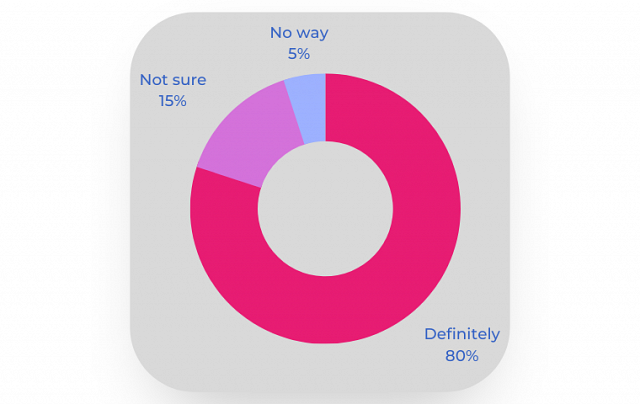A Shorter Working Week
29th June 2022
Thousands of UK workers are taking part in a six-month pilot testing the merits of a shorter working week and the impact on productivity, wellbeing, the environment, and gender equality.
We wanted to understand what our community on Linkedin, who are predominantly from the northeast of Scotland, felt about the impact of switching to a four-day working week so we posed this poll question:
If you had to switch to a four-day work week in your current job would it improve your productivity and well-being?

The result revealed overwhelming support with 80 percent of respondents in favour, agreeing that it would "definitely" improve productivity and wellbeing, 15 percent were 'not sure', and 5 percent said, 'definitely not'.
At first glance the feedback isn't surprising and reflects the increased flexibility workers are looking for, compressing the time devoted to work into fewer days, and enabling greater choice around what to do with time spent outwith work.
The results also reflect what we hear in many of our candidate conversations as Amanda McCulloch explains,
"We are definitely seeing a move towards more hybrid working with employees balancing their time between home and the workplace. Coupled with this, a four-day working week is also emerging as a desirable feature for those looking for a new career opportunity."
Organisations already adopting the four-day week model highlight an increase in employee satisfaction, company commitment, and teamwork, with benefits to overall wellbeing also cited.
However, a fifth of respondents didn't wholeheartedly agree that their productivity and well-being would improve and that points to:
- the importance of communication between an employer and employees,
- not making assumptions about what people want, and
- taking into consideration the capacity for change depending on the type of work performed.
Employers are beginning to adapt to the changing expectations of the workforce. As well as the more obvious benefits like better work-life balance, we also foresee wider environmental benefits. For example, a by-product of less travel and occupied office space could be a reduction in carbon footprint.
However, it would be wrong to assume everyone wants the same thing.
Compressing the number of days worked, and not reducing the total number of hours worked, creates long work days which could be draining, and actually erode productivity rather than enhance it. So, it's important that the way in which a four day week is implemented is carefully considered. Which days are the working days and how are they determined across the team? Are overall hours worked reduced or compressed?
There's also the potential for less effective communication between workers if how people interact isn't considered and of course, not everyone wants more time to themselves, particularly if they find work is an antidote for loneliness or a healthy source of mental stimulation and personal fulfilment.










